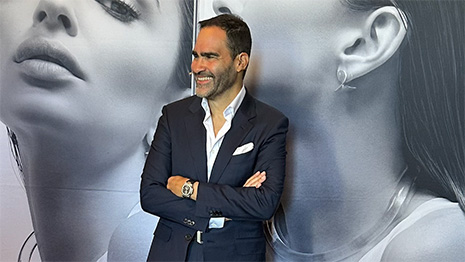 Daniel Langer is the founder and CEO of consulting firm Équité
Daniel Langer is the founder and CEO of consulting firm Équité
I always urge brands to remember: luxury is extreme value creation, and the perception of extreme value delivery needs to be earned in every single client interaction.
Otherwise it is what I like to call “luxury in ambition only.” Whenever my team at Équité interviews luxury clients, we hear again and again the feeling to be treated as “walking wallets.” Transactional client experiences are everywhere.
The emotional void in modern luxury
The luxury sector faces a paradox: despite all the allure brands are trying to evoke, loyalty stagnates as customers feel emotionally disconnected.
Our research indicates that a significant number of luxury shoppers under 35 believe brands prioritize profits over personal connections, a crisis of experiential relevance. When an industry underindexes with the clients of the future, there is trouble ahead.
Consumers now seek emotional validation alongside material validation, yet brands cling to transactional tactics. A recent report from Bain & Company reveals that experiences drive the vast majority of luxury spending growth, but many interactions remain impersonal.
A viral TikTok clip of a hotel guest receiving a barcode-stickered room key sparked outrage: “Luxury should feel human, not like a UPS checkout.” Neuroscience indicates that luxury purchases trigger brain rewards three times stronger than those from practical buys, but only when experiences resonate emotionally.
And my research over the past two decades on luxury drivers and the psychology behind luxury purchases shows that luxury is bought because of the anticipation of a positive perception shift. If a client is treated below their expectations, the entire value delivery falls apart.
In countless sales and luxury experience masterclasses all over the world, I have seen the same pattern: even experienced luxury professionals underestimate the significant influence they have, both positively and negatively.
Social media: The mirror of discontent
Across social media platforms, the hashtag #LuxuryFail exposes systemic failures, including robotic personalization – “bespoke” emails addressed to “Dear Customer”) – as well as greenwashing claims and culturally insensitive communication.
Meanwhile, dupes thrive by offering emotional value. A Guangzhou artisan’s TikTok of hand-stitched bags “homaging” French singer and lyricist Edith Piaf earned 14 million likes, with viewers praising “craftsmanship Chanel forgot.”
Luxury training often neglects emotional intelligence, costing brands billions annually in lost sales and profits from hesitant shoppers. While up to 90 percent of luxury interactions start online, few brands bridge digital-personal divides.
A common example is that clients complain about chatbots and other promises of care that stores do not deliver on.
Gen Z’s spending growth clashes with a common feeling that brands “don’t speak their language,” evident in misfired campaigns like Gucci’s “nostalgia bait for boomers.”
I dedicated a recent “Future of Luxury” podcast episode to the communication gaps between brands and clients. Achieving true emotional loyalty in luxury requires brands to move far beyond transactional gestures or surface-level personalization.
It demands a deep understanding of each client’s unique emotional landscape, and the ability to respond with genuine empathy, intuition and flexibility. This means training teams not just in product knowledge, but in the art of reading subtle cues, listening actively and adapting interactions in real time to reflect the client’s mood, needs and aspirations.
In many of my trainings, I can observe how difficult it is for client-facing teams to deliver on this. It sounds intuitive and easy, but when I ask participants to roleplay, everything changes.
“This was really hard” is the most common feedback I get, and it shows how much potential is lost in the day-to-day when teams are not prepared well to unlock the emotional key.
Expert insights: Missed connections
True emotional loyalty is built when clients feel not only remembered, but truly valued. Every touchpoint, whether digital or physical, needs to be infused with authentic care and thoughtful anticipation.
Unfortunately, this is the exception, not the rule. Brands that succeed in this new era of luxury are those that treat every client interaction as an opportunity to create meaning, not just deliver service.
They prioritize emotional resonance over scripted experiences, and invest in cultivating long-term relationships rooted in trust, respect and shared values. This approach transforms fleeting transactions into lasting bonds, turning clients into passionate advocates who return not simply for products but for the sense of belonging and recognition that only a truly emotionally intelligent brand can provide.
Luxury’s future lies in crafting experiences that validate human stories by being deeply human. As neuroscience indicates, “feeling seen” mirrors romantic love’s brain patterns.
Brands mastering emotional agility will thrive. The revolution pulses in every comment, like and share; it is my call to feel, not to transact.
Luxury Unfiltered is a weekly column by Daniel Langer. He is the CEO of Équité, a global luxury strategy and creative brand activation firm, where he is the advisor to some of the most iconic luxury brands. He is recognized as a global top-five luxury key opinion leader. He serves as the executive professor of luxury strategy and pricing at Pepperdine University in Malibu and as a professor of luxury at New York University, New York. Dr. Langer has authored best-selling books on luxury management in English and Chinese and is a respected global keynote speaker.
Dr. Langer conducts masterclass management training on various luxury topics around the world. As a luxury expert featured on Bloomberg TV, Financial Times, The New York Times, Forbes, The Economist and others, Mr. Langer holds an MBA and a Ph.D. in luxury management and has received education from Harvard Business School. Follow him on LinkedIn and Instagram, and listen to his “Future of Luxury” Podcast.